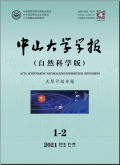中山大学学报(自然科学版)(中英文)2024,Vol.63Issue(1):10-23,14.DOI:10.13471/j.cnki.acta.snus.2023D032
基于LiDAR数据的汕尾火山嶂地质灾害风险评价
Geological disaster risk assessment of Huoshanzhang in Shanwei of Guangdong based on LiDAR data
摘要
Abstract
Airborne LiDAR(light detection and ranging)data are effective for geological hazard risk assessment in vegetation-covered areas because vegetation information can be removed and thus pro-vide true surface morphology.Huoshanzhang in Shanwei,Guangdong Province is a steep and densely vegetated area that is prone to landslides,collapses,and mudslides.This study adopted high-resolution LiDAR data to generate high-precision DEM data and extract terrain factors such as slope,aspect,cur-vature,undulation,roughness,and mountain shadows,combined with remote sensing images of GF-1 satellite,identified a total of 44 landslides/collapses.Among them,three low-probability landslides/collapses were removed based on the variable dimensional and fractal model,the determined weight of each terrain factor,and the confirmed probability of each interpreted landslide/collapse.The area was divided into 6 sub-regions according to the characteristics of the valleys and the geological hazard risk assessment of each sub-region was conducted based on the terrain characteristics,landslide/collapse density and volume,and human activities.The results indicate that high-precision terrain factors gener-ated from LiDAR data of vegetation impacts eliminated are an effective source for geological hazard in-terpretation in vegetation-covered areas.关键词
地质灾害/LiDAR/风险评价/火山嶂Key words
geological disaster/LiDAR/risk assessment/Huoshanzhang分类
天文与地球科学引用本文复制引用
甄俊伟,黄智炜,章桂芳,曾探,王同皓..基于LiDAR数据的汕尾火山嶂地质灾害风险评价[J].中山大学学报(自然科学版)(中英文),2024,63(1):10-23,14.基金项目
2022年度中央财政地质灾害防治专项(441501-2022-00826) (441501-2022-00826)
广东国家公园建设专项(2021GJGY026) (2021GJGY026)
南方海洋科学与工程广东省实验室(珠海)创新团队建设项目(311022004) (珠海)
广州市科技计划项目(201707010209) (201707010209)
广东省基础与应用基础研究基金(2019A1515010733) (2019A1515010733)

